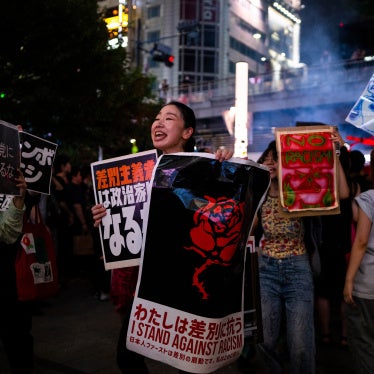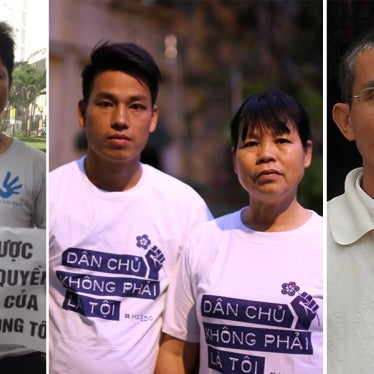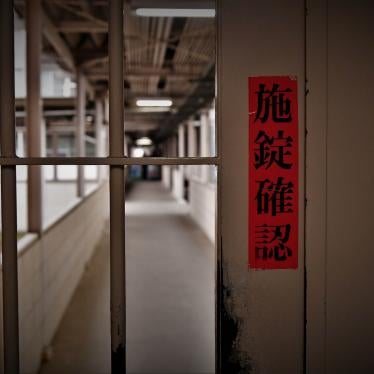Dear Prime Minister Kishida,
We write to you on behalf of Human Rights Watch to draw your attention to the dire human rights situation in Vietnam in advance of the trip of the Vietnamese President Nguyen Xuan Phuc to Tokyo to attend the state funeral for former Prime Minister Shinzo Abe on September 27. Specifically, we urge you to raise these issues publicly as well as privately in your upcoming meetings with the Vietnamese President. Considering that Japan is Vietnam’s largest source of international development aid and assistance, we believe that your government is in a very favorable position to persuade Vietnam to improve the human rights situation in the country.
No one doubts that there are significant challenges in changing Vietnam’s rights-abusing policies, but it is clear that progress can be made if the international community, led by Japan and other like-minded governments, makes concerted efforts. The rights of lesbian, gay, bisexual and transgender (LGBT) people are a good example, as evident on August 3, 2022, when Vietnam’s Ministry of Health officially confirmed that same-sex attraction and being transgender are not mental health conditions, and issued orders to hospitals and health providers to end discriminatory and abusive treatment of LGBT people. This change of policy aligned with advocacy by various governments and their embassies in Hanoi, and United Nations agencies, that Vietnam should bring its health policy on LGBT persons into line with global health and international human rights standards.
However, much more action is needed. The Vietnam government continues to severely repress basic civil and political rights, including freedom of expression, association, peaceful assembly, and to freedom of religion and belief. It prohibits the formation and operation of any organization or group that the Vietnam Communist Party deems threatening to its monopoly of power. Authorities regularly block access to websites and request that social media and telecommunications companies remove content deemed to be politically sensitive. Those who publicly criticize the one-party state, including on social media, face police intimidation, harassment, restricted movement, physical assault, and arbitrary arrest and detention. Police often detain political activists for months and subject them to abusive interrogations without access to legal counsel. Party-controlled courts convict bloggers and activists on bogus national security charges and impose lengthy prison sentences.
Human Rights Watch recommends that your government focus on four priority areas regarding the dire human rights situation in Vietnam: 1) political prisoners and detainees; 2) repression of freedom of movement; 3) repression of freedom of information; and 4) repression of the right to belief and to freely practice religion.
1. Political Prisoners and Detainees
Vietnamese authorities frequently use vaguely worded and loosely interpreted provisions in the penal code and other laws to prosecute and imprison political and religious activists. These include “carrying out activities aimed at overthrowing the people’s administration” (article 109), “undermining the unity policy” (article 116), “making, storing, disseminating or propagandizing information, materials and products that aim to oppose the State of the Socialist Republic of Vietnam” (article 117)/or “conducting propaganda against the state” (article 88 of the 1999 penal code), and “disrupting security” (article 118). The authorities also use other articles in the penal code to target rights campaigners, including “abusing the rights to democracy and freedoms to infringe upon the interests of the State, the legitimate rights and interests of organizations, individuals” (article 331), and “disrupting public order” (article 318). Recently, the authorities prosecuted and imprisoned environmental and climate change activists, including 2018 Goldman Environmental Award laureate Nguy Thi Khanh, under politically motivated charges of “tax evasion” (article 200).
Vietnam currently holds at least 164 political prisoners. During the first nine months of 2022 alone, the courts convicted at least 25 people for voicing criticism of the government, campaigning for human rights, environment or democracy, and sentenced them to many years in prison, including journalist Mai Phan Loi and lawyer Dang Dinh Bach, and citizen journalist Le Van Dung (also known as Le Dung Vova). In August, a court in Hanoi rejected the appeals of prominent blogger Pham Doan Trang, land rights activists Trinh Ba Phuong and Nguyen Thi Tam. Police have also arrested at least 14 additional people on politically motivated charges including prominent human rights defenders Nguyen Thuy Hanh, Nguyen Lan Thang, and Bui Tuan Lam.
Vietnam’s Criminal Procedure Code stipulates that the procurator of the People’s Supreme Procuracy can decide to hold a person suspected of violating national security in detention until the investigation is concluded (article 173(5)), and can restrict the detainee’s access to legal counsel until after investigation is concluded (article 74). In practice, this means that those who are suspected of violating so-called national security offenses are regularly held in police custody without access to a lawyer for as long as the authorities see fit.
Japan should publicly and privately call on the Vietnamese government to:
- Immediately release all political prisoners and detainees, including those imprisoned or detained for exercising their basic civil and political rights.
- Repeal penal code articles 109, 116, 117, 118 and 331 or amend them to conform with Vietnam’s obligations under the International Covenant on Civil and Political Rights (ICCPR), which Vietnam ratified in 1982.
- Amend or repeal article 74 and article 173 of the Criminal Procedure Code to permit all people detained for any alleged violations, including national security crimes, to have immediate access to legal counsel upon being arrested.
2. Repression of Freedom of Movement
The Vietnam government routinely violates the right to freedom of movement and other basic rights by subjecting activists, dissidents, human rights defenders, and others to indefinite house arrest, harassment, and other arbitrary forms of detention. The authorities frequently detain activists just long enough to prevent them from attending public protests, trials of fellow activists, meetings with foreign diplomats, or other human rights-related events.
Security agents keep people under house arrest by stationing plainclothes security agents outside homes, using padlocks to lock people inside, erecting roadblocks and other barriers to prevent people from leaving their homes and others from entering, mobilizing neighborhood thugs to intimidate people into staying home, and even applying very strong adhesives - such as “superglue” - on homeowner’s locks.
The Vietnam government also systematically blocks rights activists, bloggers, dissidents, and their family members from domestic and international travel, including by stopping them at airports and border gates, and denying passports or other documents that would allow them to leave or enter the country.
Human Rights Watch’s report, “Locked Inside Our Home: Movement Restrictions on Rights Activists in Vietnam,” published in February 2022, details Vietnam’s systemic and severe restrictions on freedom of movement between 2004 and 2021.
In March 2022, security agents prevented eight democracy supporters from attending an event in Hanoi in support of Ukraine after Russia’s full-scale invasion in February.
Japan should publicly and privately call on the Vietnamese government to:
- Immediately end arbitrary restrictions on the right to freedom of movement, including house arrests, detention, harassment, surveillance, and domestic and international travel bans, that are imposed against activists and other critics of the government.
- Immediately end the practice of placing citizens on travel ban lists. Anyone lawfully placed on a travel ban list should be immediately and properly notified, told the reason for the placement, and be able to appeal the decision to an independent and impartial court.
- Repeal or amend article 14(2) and article 15(4) of the Constitution, which allows for restrictions on human rights for reasons of national security that far go beyond the restrictions permissible under international human rights law.
- Repeal or amend provisions of the Law on Immigration that allow the authorities to arbitrarily ban Vietnamese citizens from traveling abroad or from returning to Vietnam on the basis of vaguely defined national security provisions.
3. Repression of Freedom of Information
The Vietnam government continues to prohibit independent or privately owned media outlets to operate. It exerts strict control over radio and TV stations and printed publications. Criminal penalties apply to those who disseminate materials deemed to oppose the government, threaten national security, reveal state secrets, or promote “reactionary” ideas. The authorities regularly block access to politically sensitive websites and frequently attempt to shut down blogs. They also require internet service providers to remove content or social media accounts that the government deems politically unacceptable.
Vietnam’s problematic cybersecurity law went into effect in January 2019. The overly broad and vague law gives authorities extremely broad discretion to censor free expression and requires service providers to take down content that authorities consider offensive within 24 hours of receiving the request.
In September 2022, the government issued a new decree that requires technology companies to open physical offices in the country and to store users’ data in Vietnam. This highly problematic decree, which will allow the government to violate online users’ rights to privacy, will be effective on October 1, 2022.
Japan should publicly and privately call on the Vietnamese government to:
- Bring all its media laws and regulations into full compliance with article 19 of the ICCPR;
- Allow the publication of uncensored, independent, privately run newspapers and magazines;
- Remove filtering, surveillance, and other restrictions on internet usage;
- Release people imprisoned or detained for peacefully disseminating their views over the internet.
- Amend the Law on Cyber Security and associated Decree 53/2022 and bring them into full compliance with international human rights standards, including the ICCPR.
- Ensure all decrees related to the Law on Cyber Security comply with international human rights standards, including the ICCPR.
4. Repression of the Right to Freely Practice Religion
The Vietnamese government restricts religious practice through legislation, registration requirements, harassment, and surveillance. Religious groups are required to gain approval from and register with the government as well as operate under government-controlled management boards. While authorities allow many government-affiliated churches and pagodas to hold worship services, they regularly ban religious activities they arbitrarily deem to be contrary to the “national interest,” “public order,” or “national unity.” As of September 2021, Vietnam acknowledged that it had not officially recognized about 140 religious groups with approximately one million followers. Most of these groups practice their belief at house churches or rental locations. The government labels Dega Protestant, Ha Mon Catholic, Falun Gong and a few other religious groups as “ta dao” (evil religion) and harasses and persecutes those who practice those beliefs.
The police monitor and sometimes violently crack down on religious groups operating outside government-controlled institutions. Unrecognized independent religious groups face constant surveillance, harassment, and intimidation, and their followers are subject to public criticism, forced renunciation of faith, detention, interrogation, torture, and prosecution.
In January 2022, the authorities of Lao Cai province announced that “with persistence” they have persuaded “many families to voluntarily sign commitments to abandon evil religion and turn to religions permitted by the law; to seriously obey the guidelines and policies of the Party, and the State’s law on religion.”
The authorities’ campaign of rights-abusing persecution of freedom of religion and belief is well documented by officials' own pronouncements. For example, in May 2022, authorities in Kon Tum province publicly boasted that they had eradicated the Catholic Ha Mon religion in the entire province. In June 2022, the authorities of Tuyen Quang province claimed that during the first four months of 2022, they had “propagandized and campaigned 70 households to abandon the illegal Duong Van Minh [religious] group and follow and believe the [Communist] Party and State.” In July 2022, authorities in Bac Kan province pledged that they planned to eradicate the Duong Van Minh group by the year 2023. They announced that within two weeks, they got “42 households with 221 people to write down commitment to abandon the illegal organization Duong Van Minh.” The police claimed approvingly that one person “agreed to take down the white canvas board and replace it with the portrait of President Ho Chi Minh offered to him by the Working Group.” In August, the local authorities of Gia Lai province reported that the provincial Religious Committee worked closely with the police force to fight against and get rid of the “evil religions” such as Catholic Ha Mon and Protestant De Ga.
In July 2022, a court in Long An province convicted and sentenced six members of Tinh That Bong Lai, a Buddhist-based group, to between three and five years in prison for “abusing the rights to freedom and democracy to infringe upon the interests of the State, the legitimate rights and interests of organizations, individuals” under article 331 of the penal code. The authorities accused them of producing video clips that “have untruthful, distorted and fabricated content that aimed to propagandize, incite and insult the reputation of the police of Duc Hoa district, of Buddhism, of the honor and dignity of Mr. Tran Ngoc Thao (Buddhist name Thich Nhat Tu).” The defendants alleged that they were tortured during interrogation, but the court dismissed their claims.
Japan should publicly and privately call on the Vietnamese government to:
- Allow all independent religious organizations to freely conduct religious activities and govern themselves. Churches and denominations that do not choose to join one of the officially authorized religious organizations with government-sanctioned boards should be allowed to operate independently.
- End the campaign of government harassment, forced denunciations of faith, arrests, prosecutions, imprisonment, and ill-treatment of people because they are followers of disfavored religions, and release anyone currently being held for peaceful exercise of the rights to freedom of religion, belief, expression, peaceful assembly and association.
- Ensure all domestic laws involving religious affairs are brought into conformity with international human rights law, including the ICCPR. Amend any provisions in domestic law that impinge on freedom of religion and belief, expression, association, or peaceful assembly in violation of the ICCPR.
- Permit outside observers, including representatives of United Nations agencies, nongovernmental organizations, and foreign diplomats, to have unhindered and unaccompanied access to the Central Highlands, including specifically to communes and villages from which Montagnards have recently departed to seek asylum abroad. Ensure there is no retribution or retaliation against anyone who speaks to or otherwise communicates with such outside observers.
Thank you for your consideration of our views on these important matters. Please do not hesitate to contact us for additional information.
Sincerely,
Kanae Doi
Japan Director
Elaine Pearson
Director, Asia Division
Cc:
Foreign Minister Yoshimasa Hayashi
Dr. Akihiko Tanaka, President, Japan International Cooperation Agency








